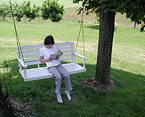

 s a kid growing up on a farm in West Michigan in the 1960s, I was often dirty,
sometimes restless, and mostly happy. My five older siblings and I worked hard, but, as any of them will gladly tell you,
they worked harder than I did.
s a kid growing up on a farm in West Michigan in the 1960s, I was often dirty,
sometimes restless, and mostly happy. My five older siblings and I worked hard, but, as any of them will gladly tell you,
they worked harder than I did.
That’s because I was a gifted child—gifted at getting out of chores. When I was supposed to be weeding the garden or picking up rocks from the fields (yes, that was actually one of our chores), I’d be riding my horse or reading a book instead. Those were my two favorite ways of escaping my normal, ordinary life.
When I couldn’t escape it, I dramatized it by coming up with headlines about whatever I was doing at the moment. If I got a poke from the electric fence that kept the cows in the pasture, for example, Girl, zapped by electric fence, lives to tell about it would pop into my head. This entertained me enormously as I did chores and had the added benefit of making my life seem more glamorous.
Until I was about nine, all I wanted to do was own a horse farm. But then one day, while reading National Geographic, I thought I might like to write for that magazine—but only if I didn’t have to travel. I wondered if I could get someone else to do the research. (See? Still trying to wriggle out of work!)
Although I eventually gave up riding, I never stopped reading. Somewhere along the line, I discovered that I could learn about my own life by watching characters in books live theirs.
I earned a college degree in English literature by doing what I’d been doing all along—reading and thinking about what I’d read.
My parents worried that it wasn’t a very practical degree. (This, from the people who had made me pick up rocks.) “What will you do, teach?” they asked. “No,” I said, “I’m going to write.” I went on to write for magazines, newspapers, and corporations. I still do.
I’ve been married for a long time to a wonderful guy who lives in constant fear of throwing away stray scraps of paper with scribbles on them. He knows from experience that those scribbles are ideas about things I’d like to write.
We have two children. Our son is 14 and listens to National Public Radio as he designs vehicles, buildings, and a better form of government. Our daughter is 12 and already sees the world with an artist’s eye. Both are smarter than I am. This gives me hope for the world more often than it causes me concern.

